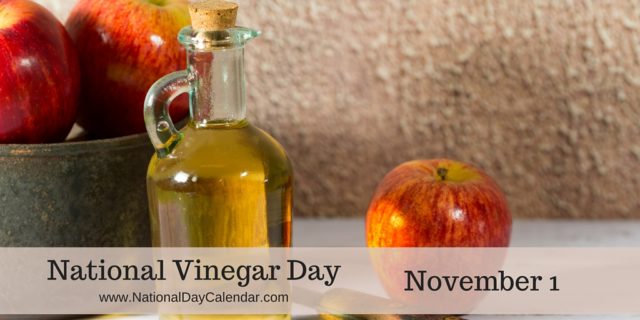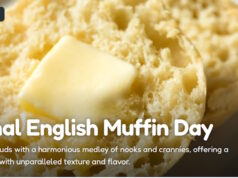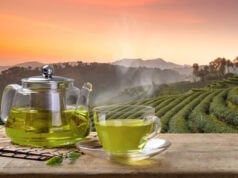
This common household product brightens many salads, is used in canning and can shine up a window, too! November 1 recognizes National Vinegar Day!
Vinegar is produced either by a fast or a slow fermentation process. Slow methods are generally used with traditional vinegar and the fermentation proceeds slowly over the course of months or up to a year.
There are many varieties of vinegar:
* Apple cider * Balsamic * Beer * Cane * Coconut * Date * Distilled vinegar * East Asian black * Flavored vinegar * Fruit * Honey * Job’s tears * Kiwifruit * Kombucha * Malt * Palm * Raisin* Rice * Sinamak * Spirit vinegar * Sherry vinegar * White * Wine *
Vinegar is:
- Most commonly used in food preparation such as pickling processes, vinaigrettes and other salad dressings
- An essential ingredient in mustard, ketchup, barbecue sauce and mayonnaise
- A popular condiment for fish and chips
- Used as a flavoring for potato chips
- Used as a dip for crab meat
- A substitute for fresh lemon juice
- Used as a sauce when roasting lamb
- Used in sushi rice
- Used as a flavoring
- Commonly put into mint sauce
- Used in making some beverages
- Used for medical remedies and treatments
- White vinegar can help treat a sunburn. Simply put a tissue over the sunburned skin and lightly spray with white vinegar. It helps restore your skin to the correct acidity and gives a cooling effect.
- Vinegar can help soothe a queasy stomach! The queasy curing cocktail is made of apple cider vinegar, water and honey.
- Used for cleaning
- Used in gardening and pest control
- The name vinegar comes to us from the French, “vin aigre,” literally meaning sour wine.
- Around 5,000 BC, the Babylonians used vinegar as both a condiment and preservative; they are also credited with the practice of adding herbs and spices to flavor it.
- Commercial vinegar is produced either by fast or slow fermentation processes.
- Historically, as the most easily available mild acid, it had a great variety of industrial, medical and domestic uses, some of which (such as its use as a general household cleanser) are still promoted today.
- To disinfect and clean your wood cutting boards or butcher block countertop, wipe them with full-strength white vinegar after each use.
- Spots caused by wine can be removed from 100 percent cotton fabrics if done so within 24 hours. Sponge the garment with white distilled vinegar directly onto the stain and rub away the spots.
- Use vinegar in a steam cleaner to reduce soap bubbles.
- Mix vinegar with linseed oil and use it to clean your wood.
- Clean eyeglasses by wiping each lens with a drop of vinegar.
- Massage white distilled vinegar into our scalp, rinse, then was with regular shampoo and watch dandruff disappear.
- Drink a teaspoon of white distilled vinegar to stop the hiccups.
Sources:












